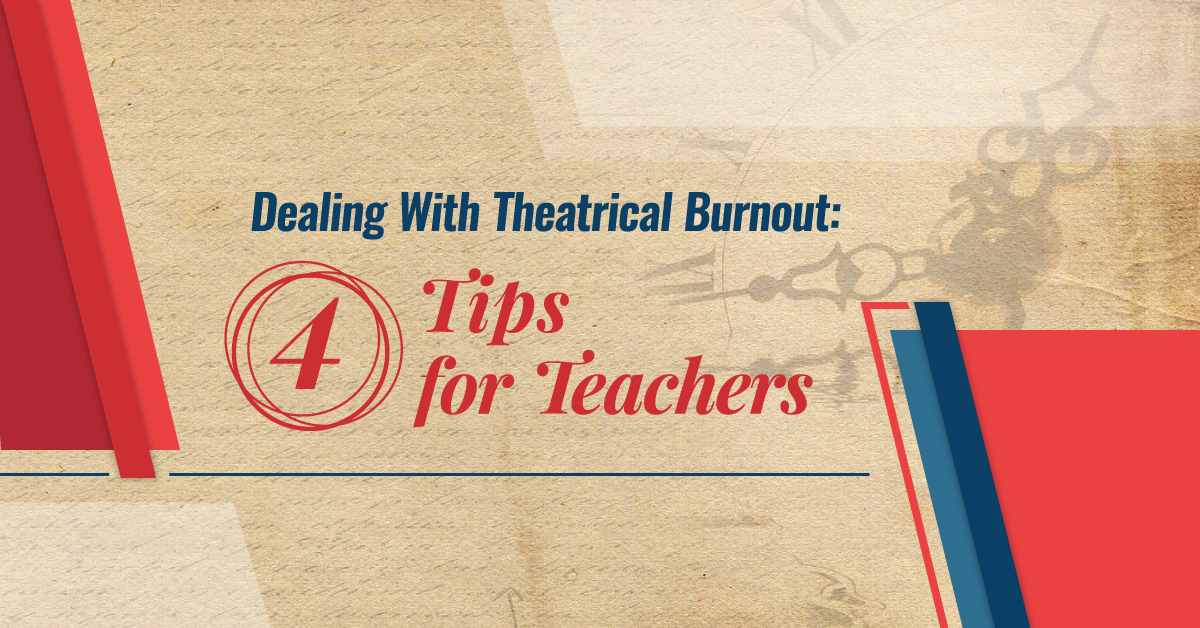How to Balance a Full Teaching Load and a Thriving Theatre Program
Being a drama teacher isn’t a full-time job… it’s TWO full-time jobs! Aside from the amount of homework and planning it takes to prepare a full teaching load, there are also the countless responsibilities associated with running a successful theatre program. It can seem difficult, if not impossible, to juggle both of these full-time jobs without burning yourself out. However, it IS possible to balance a full teaching load and thriving theatre program. Here are some tips and tools that veteran drama teachers can use to teach their classes while maintaining and running their programs.
Have a plan
Balancing teaching and production does not happen by accident; it takes a lot of planning. That means you will need to think ahead, organize your responsibilities, and create a plan for how you will successfully execute all your activities. Envision the steps necessary to keep both your classroom and your theatre running smoothly, and start putting pieces in place to make sure those steps happen. Keep in mind that due to circumstances beyond your control, some of your plans might not always work out, but remember: the more you plan for the future, the less scary that future becomes. Having a plan gives you a path to follow and makes it more likely that you will complete the journey.
Be prepared
Preparation goes hand in hand with planning. There is no worse feeling than standing in front of a group of students and being unprepared. Whether you are preparing lesson plans, or are generating the necessary paperwork for the next after school audition, being prepared for events before students walk through the door is the difference between a panic attack and a walk in the park. The stress of being unprepared will burn you out faster than almost anything else in the world of teaching, so use your planning period as effectively as possible and take the time to prepare ahead of time whenever possible.
Delegate
There are a LOT of responsibilities associated with having two full-time jobs. That is why you should delegate as many appropriate responsibilities as possible. From having students distribute and collect papers in your classroom, to giving parents the authority to build set pieces off site, any tasks that you can take off your plate will give you the breathing room to manage the responsibilities that you CANNOT delegate, such as grading papers or directing the show. Furthermore, delegating responsibilities throughout the production process has the additional benefits of providing students with valuable leadership opportunities and greater ownership of the production.
Self-care
The key to a long and successful career is self-care. The most successful drama teachers know that they need to take a break every now and again to reset their brain and recharge their batteries, otherwise they run the risk of burning out. Balancing full-time teaching with a successful theatre program is exhausting under the best of circumstances, and if you don’t take the time to unplug, you won’t last more than a handful of years before you crash and burn. Take the time you need to step away from the stresses of teaching and producing and connect with your family and friends. Unplug for the weekend or plan a trip for spring break, knowing that your classes and your program will be there when you get back. An occasional investment in yourself will pay dividends in sustaining your long-term career plans.
Additional Reading:
How do I maintain work/life balance as a drama teacher?
Drama Teacher Self-Care (And No, We Don’t Mean Candles and Bubble Baths)
20 Self-Care Actions For Drama Teachers



